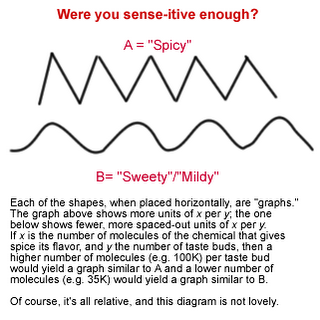 The answer to the Sense-itivity quiz is here. For the sane amongst us - a friendly version is in the diagram. Study it, be happy, sleep well. For the mad, the following:
The answer to the Sense-itivity quiz is here. For the sane amongst us - a friendly version is in the diagram. Study it, be happy, sleep well. For the mad, the following:The epiphany occurred, as it usually does with me, during a conversation. Ahad A. and I were talking about where is knowledge found when I drew up the shapes of Spicy & Sweety and quizzed him. Actually, I gave him the more mathematically correct but less glamorous version: which of the two is Spicy, and the other Mildy?
The answer came after I drew up the shapes. I found a brand new angle on the old quiz: Why would we call Kiki, Kiki? Why not call it Booba?
If you have no idea what I am talking about and think I just delivered the latest in high street insults your way, you will be de-mystified shortly. But I am not talking about curses; I am talking about a famous test on synaesthesia.
Synaesthesia – or the synthesis of senses – is a fascinating subject. You will usually hear of it in eccentric tales of “colors of music” and experience it closer at home when you decide the taste of food just by its smell. Those very smart with audio-visual effects will also know instinctively that synaesthesia also occurs when music is represented by the exotic visualizations of most modern audio players such as Windows Media Player.
Syn+aesthesia. A synergy of aesthetic senses. How, when senses combine, they create a whole larger than the sum of the parts.
I have been researching, experimenting on, and theorizing on a unified theory of senses for some time.
Separately, I came across the Azeemi (Indian Sub-continental Sufi silsila) concept of “wavelength” meanwhile while learning about spirituality and understanding how God’s design works. Yet the Azeemis are only marginally educated in the fields of physics, mathematics, and art – and they have not explained the concept in terms other than purely spiritual/ esoteric.
The Azeemi elders suggest that there is a “wavelength” and a “light” going around in and sustaining the Universe. They suggest that everything has a “wavelength,” but stop just short of explaining it more sophisticatedly.
While I drew those shapes Spicy & Sweety for Ahad, I was drawing a variant of the Kiki & Booba test.
Then suddenly, the dots connected.
Wavelengths. Graphs, that I had just been thinking about. Mathematics.
I remembered asking myself those very days why I could not separate the math of the graph from the shape of it, and the shape of it from reality of a traveling particle? Why oh why is the sharper shape Spicy? Why is the more toned shape Sweety/ Mildy?
Funny how things come together. Synthesis!
Allow me to use the more correct term Mildy to explain the answer.
These shapes in the quiz are two different graphs. We know that the taste of spice is caused by molecules of certain chemicals (Vitamin C, potassium, etc.) when they come in contact with our taste buds.
The more taste buds a person has, the better their sense of taste. A taste bud is like a catching mattress. The larger the mattress, the bigger can be a falling object to catch on the mattress. The more taste buds one has, the more molecules of a chemical they catch. But suppose a limited number of taste buds, says 10,000 on a tongue. Then take a bit of a sauce with 1,000,000 molecules of potassium. That’s 100 molecules per taste bud.
Take a bit of a sauce with 30,000 molecules of potassium. That’s 3 m/tb. It will taste "Mildy” and perhaps even “Sweety” if taken after the first.
If you plot a graph for the first, it’s sharper, like A. If you plot one for the second, it is closer to the baseline, like B. (B gets its curves from continuous tasting, but that’s irrelevant.)
These graphs are also wavelengths in shape!
So. Think about it. Even taste has a “wavelength.” That wavelength has a shape. Somewhere in our minds, we can associate that shape with the taste. Spicy is sharper looking. Sweety or Mildy has gentler, smaller slopes.
As I said earlier, we have been seeing music represented with wavelengths all our lives. For a sense of touch, we can quickly develop a Thorny/ Grainy/ Smoothy test.
Does this mean that our minds have a de-coder where all senses get processed based on the very unfunny shapes of wavelengths? And do these wavelengths lead us to a theory of universal aesthetic?
(And does an overload of waves lead to certain psychologocial disorders?)
.







